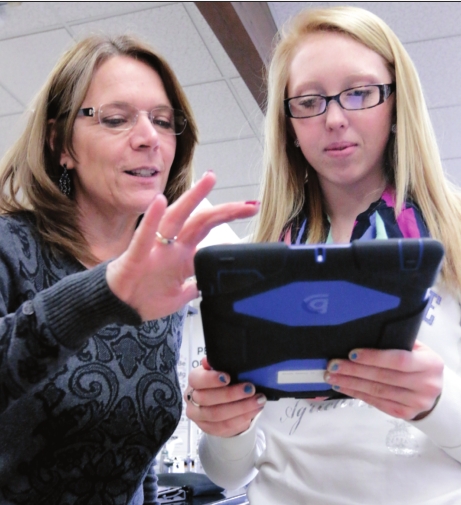
Parkview goes digital to teach technology and save money
ORFORDVILLE
While school districts slash budgets and cut costs, the Parkview School District improved student learning and saved $13,000.
Impossible you say? Not according to district officials, who say they replaced 137 science and 80 biology books at a cost of $60 each with tablets loaded with free digital textbooks.
It’s all part of a plan to not only modernize but also save money, they say.
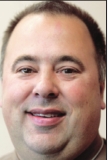 “Most colleges require students to be capable of using technology at a high level when they enroll,” said Steve Lutzke, administrator at the Parkview School District. “Many skilled jobs also require a high degree of computer literacy.”
“Most colleges require students to be capable of using technology at a high level when they enroll,” said Steve Lutzke, administrator at the Parkview School District. “Many skilled jobs also require a high degree of computer literacy.”
The district will spend about $130,000 on tablets this year and in 2014-15 and 2015- 16, Lutzke said.
“The district reallocated funds from the textbook budget, non-capital budget, general supplies, personnel services and from other miscellaneous accounts,” Lutzke said. “As a result, we did not increase our budget by implementing the iPads. We simply reallocated funds. The $13,000 was the cost we would have incurred buying the science textbooks.”
According to a study conducted by Pew Research, of 2,462 Advanced Placement and national writing project teachers, 92 percent said the Internet has a major impact on the ability to access content, resources and materials for teaching.
In addition, 73 percent say they and/or their students use mobile phones in the classroom to complete assignments, 45 percent use e-readers and 43 percent use tablet computers.
“The implementation of iPads into the district will increase student achievement by making learning more engaging, creative and relevant while also increasing the computer literacy of our student body,” Lutzke said. “As a result, Parkview students are ready to succeed in the 21st century.”
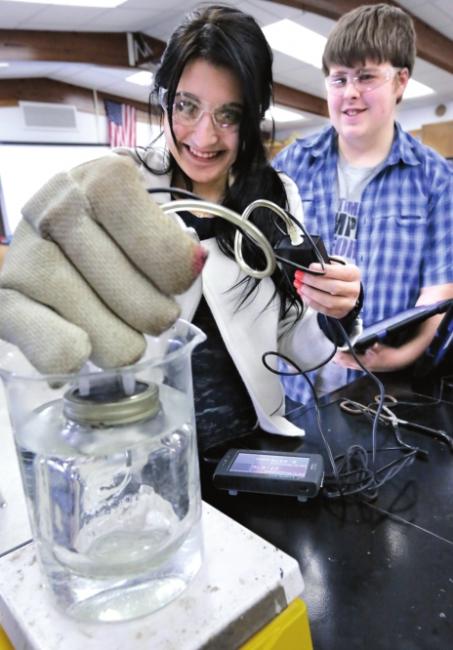 The Parkview 1:1 technology initiative was implemented this year and has provided every student with an iPad in grades 7-12. That’s a total of 304 iPads for students in grades 9-12 at Parkview High School and 137 for grades 7-8. Grades 7-9 received iPads in September, and grades 10-12 got theirs in November. The district also installed wireless access points in summer 2013 so the iPads could connect to the Internet.
The Parkview 1:1 technology initiative was implemented this year and has provided every student with an iPad in grades 7-12. That’s a total of 304 iPads for students in grades 9-12 at Parkview High School and 137 for grades 7-8. Grades 7-9 received iPads in September, and grades 10-12 got theirs in November. The district also installed wireless access points in summer 2013 so the iPads could connect to the Internet.
Parkview Elementary has 125 iPads being used by students, and Parkview Primary has 50, Lutzke said. There are 216 students at the elementary school and 219 at the primary school. Lutzke said the district’s plan is to eventually equip all students with the devices.
“Students are using the iPads for schoolwork at both home and school,” Lutzke said. “Students in the elementary schools have iPads available to use while at school.
The iPads will also provide students with improved opportunities to write and illustrate reports, peer edit and critique each other’s work and publish their work for other’s to see.”
Don Creswell, Parkview Middle School science teacher, said his students are eager to answer questions using the iPads and SMART Boards in his classroom.
“The wonderful thing about the tablets and other technologies we are using is that teachers can adapt them to specific content needs,” Creswell said. “I use a set of apps
and know teachers who use other apps. We share information about apps
we find productive and adopt what works in our content areas.”
A
SMART Board is a super-sized example of a touch screen, Creswell said.
He said students are more able to learn interactively using technology
than through traditional paper and pen learning.
“Students
are excited to raise their hands to answer a question and come to the
SMART Board to reveal the answer by touch,” Creswell said. “Teachers can
interact with a SMART Board lesson just like a chalkboard and save what
they have done.”
Creswell
said the iPads are used as organizational tools. Students complete
their assignments using the eBackpack app. The app allows teachers to
release work in folders to the students. Students then complete it and
return it within the app.
“The
set up of folders in eBackpack models the best electronic organization
for students, which many current adults have not mastered,” Creswell
said. “Teachers in any class also have the flexibility to screen and use
new apps all the time.”
Suzy Breneman teaches biology, chemistry and advanced chemistry at Parkview High School and uses tablets in all her classes.
Advanced
Placement chemistry and biology adopted digital textbooks in lieu of
traditional paper books. The Advanced Placement e-books had to be
bought, but the biology books were free. The digital science textbooks
for grades 7 and 8 were also adopted free.
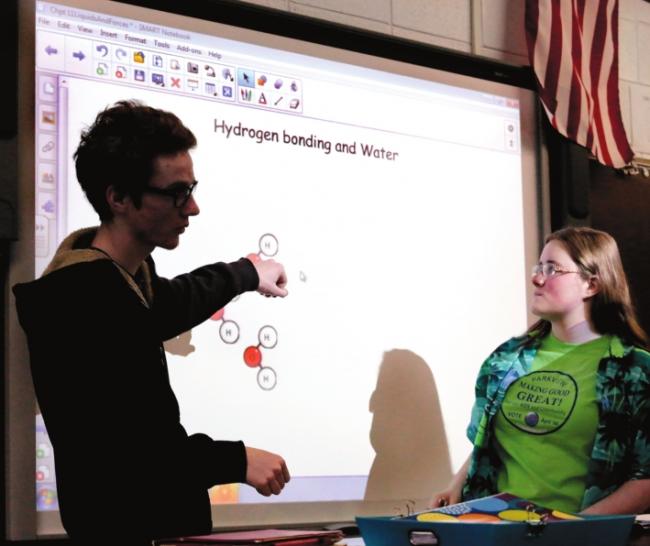 “The
e-texts are nice in that students can search quickly, take notes
directly on the book and share information with other students in an
online forum,” Breneman said. “In addition, as new revisions are
published, the students get them right away without additional charge to
the district.
“The
e-texts are nice in that students can search quickly, take notes
directly on the book and share information with other students in an
online forum,” Breneman said. “In addition, as new revisions are
published, the students get them right away without additional charge to
the district.
“Of
course, the students like not having to haul a big textbook around. We
also don’t have to worry about wear and tear of a physical book. This
has been very cost effective for us.”
The wear and tear of the iPads has been minimal, Lutzke said.
“We
provided a very durable case for the devices,” Lutzke said. “Since
September, we have had less that half a dozen damaged iPads. We have had
one or two go missing, as well. While the devices are under warranty,
they are returned to the company for repair. After the warranty expires,
we will fix them in house or utilize a repair service in the area.”
Breneman said using the technology allows teachers to tailor assignments to fit the goals of a particular course.
“The
students get instant feedback and tutorials while they are doing their
homework,” Breneman said. “This year’s students have found it very
beneficial, especially the tutorial portion, which actually tells them
where they may have gone wrong and points them in the right direction. I
like it because the students get feedback and instruction from a source
other than me, which adds another perspective. I also like not having
to correct worksheets.”
Advanced
Placement chemistry and biology adopted digital textbooks in lieu of
traditional paper books. The Advanced Placement e-books had to be
bought, but the biology books were free. The digital science textbooks
for grades 7 and 8 were also adopted free.
The district’s
ultimate goal, Lutzke said, is to replace aging textbooks with digital
ones so the district eventually will be on an all-digital platform.
“Our goal is to eliminate traditional textbooks, but this will evolve over the next five to seven years,” Lutzke said.
The district replaced all of the math textbooks with new traditional textbooks in 2012, Lutzke said.
“These
books will serve our needs for the next three to five years,” Lutzke
said. “During this time, we will review options for digital books, and
when we find a viable digital option, we will make the switch.”
He said that the timetable is fluid.
“These
devices are serving several very important functions,” Lutzke said.
“For example, students will be able to quickly find current research on
important topics. Furthermore, communication with classmates, teachers
and individuals around the world will be more immediate, creative and
efficient.
“Additionally, students will be able to increase their creativity and problem-solving skills using the iPads.”
MILTON SCHOOLS TURN TO TABLETS
Shelly
Kress, a seventh-grade teacher, said the Milton School District is
implementing a technology initiative next fall that will provide all
students with tablets or laptops.
“The biggest advantage I have seen is the engagement,” Kress said.“Students are more engaged when using technology.”
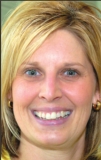 Next
year, kindergarten through third-grade students will have iPads to use
at school; grades four through six will be able to take the tablets home
at times; grades seven and eight will have their own iPads, and 9- 12th
grades will have their own laptops.
Next
year, kindergarten through third-grade students will have iPads to use
at school; grades four through six will be able to take the tablets home
at times; grades seven and eight will have their own iPads, and 9- 12th
grades will have their own laptops.
“Students
we have surveyed like the organizational benefit,” Kress said.“They
think the technology helps them to keep track of their assignments and
helps with their creativity.”
The district eventually will look toward not buying textbooks but not immediately.
Existing budget money paid for the project.
“It’s been a really good experience for us,” Kress said.“It’s been a benefit for student learning.”